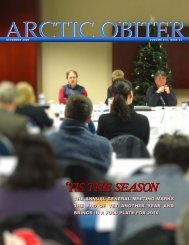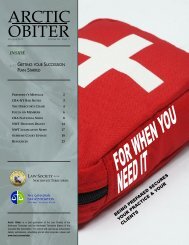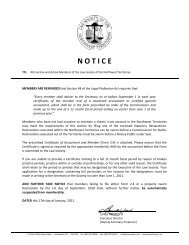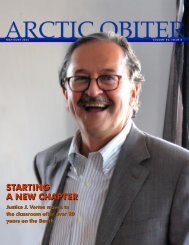ARCTIC OBITER
March/April 2013 - Law Society of the Northwest Territories
March/April 2013 - Law Society of the Northwest Territories
- No tags were found...
You also want an ePaper? Increase the reach of your titles
YUMPU automatically turns print PDFs into web optimized ePapers that Google loves.
order was appropriate.<br />
~<br />
CRIMINAL LAW – SENTENCING<br />
– SEXUAL ASSAULT<br />
R v Clillie<br />
2013 NWTSC 21 (March 27, 2013)<br />
Presiding: Justice L.A. Charbonneau<br />
For the Crown: J. Bond<br />
For the Accused: T. Boyd<br />
The 32-year-old Aboriginal<br />
offender was sentenced to one day<br />
imprisonment and three years’<br />
probation, after credit of one year<br />
for pre-sentence custody,<br />
following his guilty plea to sexual<br />
assault. The offender pulled the<br />
victim into an empty bedroom,<br />
pushed the bed against the door,<br />
pinned the victim on the bed, and<br />
grabbed at her breasts and crotch<br />
over her clothing as she screamed<br />
for help. A friend of the victim<br />
tried to help but could not get the<br />
door open. The police were called<br />
and when they were able to get the<br />
door open they found the offender<br />
holding the victim on the bed.<br />
This case is very different from a<br />
‘groping’ case. This was not an<br />
intoxicated person ‘groping’ a<br />
clothed woman, but an intoxicated<br />
man determined to force his will<br />
on a woman and completely<br />
ignore her views of the matter and<br />
to use force to confine her and<br />
subdue her to his will. The<br />
offender had a long criminal<br />
record, including a prior sexual<br />
assault charge.<br />
This decision<br />
should not be considered as a<br />
precedent showing the usual range<br />
of sentence that would normally be<br />
imposed with these kinds of facts<br />
and this kind of criminal record.<br />
~<br />
TERRITORIAL<br />
COURT<br />
CIVIL PROCEDURE – COSTS OF<br />
COUNSEL<br />
Wind Dancer Contracting v 851791<br />
NWT Ltd<br />
2013 NWTTC 03 (February 11, 2013)<br />
Presiding: Judge C. Gagnon<br />
For the Plaintiff: self-represented<br />
For the Defendant: D. McNiven<br />
The plaintiff was partially<br />
successful on his claim, but did not<br />
recover more than the sum paid<br />
into court.<br />
applied.<br />
Rule 29(5) therefore<br />
The defendant sought<br />
costs, including costs for travel and<br />
a c c o m m o d a t i o n s f o r t h e<br />
defendant’s legal counsel.<br />
The rules of the Territorial Court<br />
are less formal than the rules of the<br />
Supreme Court of the NWT, for<br />
example, by not requiring that<br />
corporations appear through<br />
counsel.<br />
Given that it was the<br />
defendant’s decision to retain<br />
counsel, the defendant should bear<br />
some of this expense.<br />
~<br />
CRIMINAL LAW – EVIDENCE –<br />
ADMISSIBILITY OF AUDIO<br />
RECORDINGS<br />
R v Giroux<br />
2013 NWTTC 04 (February 27, 2013)<br />
Presiding: Judge G. Malakoe<br />
For the Crown: J. Bond<br />
For the Accused: M. Martin<br />
The accused was charged with<br />
attempt to obstruct justice by<br />
contacting a witness by telephone<br />
from North Slave Correctional<br />
Centre. The Crown sought to<br />
introduce a DVD containing an<br />
audio recording of the telephone<br />
conversation as evidence. The<br />
preliminary inquiry judge denied<br />
the application to introduce the<br />
DVD under section 540(7) of the<br />
Criminal Code. The Crown then<br />
sought to have the DVD admitted<br />
as “demonstrative evidence”.<br />
The evidence was excluded –<br />
Physical evidence of an offence is<br />
often referred to as real evidence.<br />
Demonstrative evidence is<br />
secondary evidence admissible to<br />
assist the trier of fact to interpret,<br />
understand or analyze testimonial,<br />
documentary or real evidence.<br />
Audiotapes are real evidence. The<br />
court can take judicial notice of the<br />
existence of technology to record a<br />
voice conversation as a digital file.<br />
<strong>ARCTIC</strong> <strong>OBITER</strong> MARCH/APRIL 2013 ■ 27
















